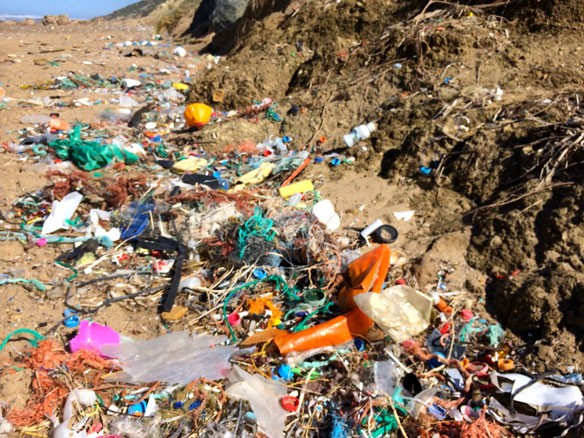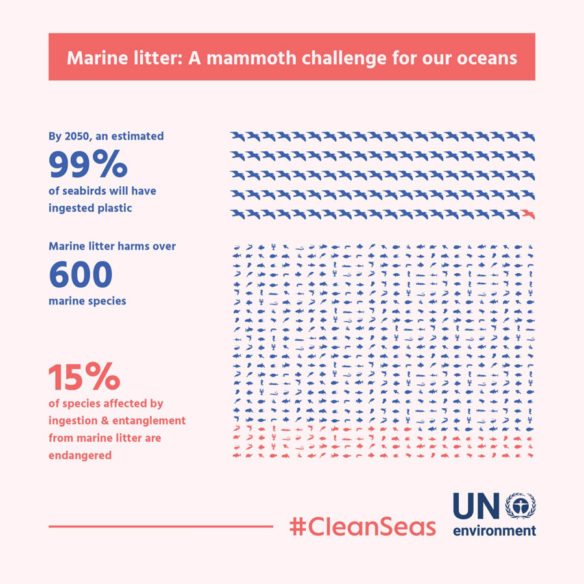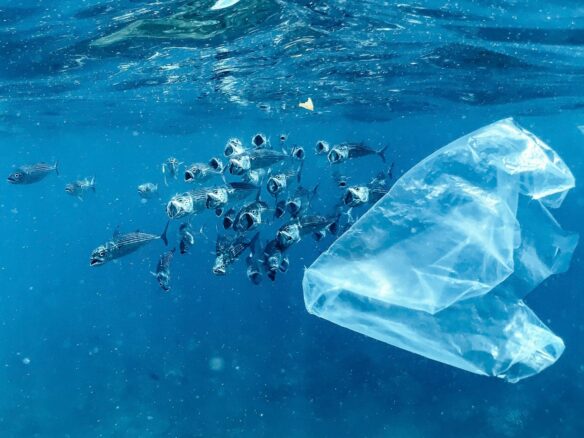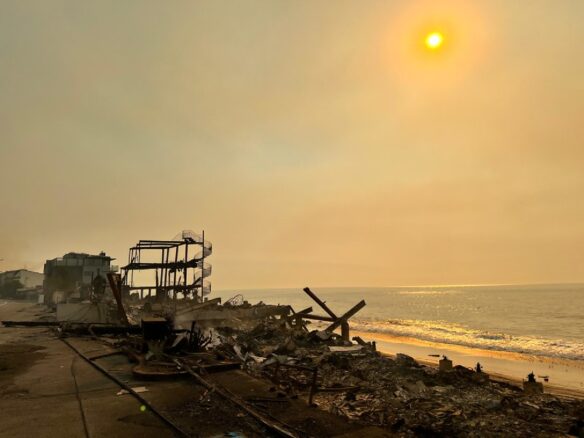
“The unprecedented plastic waste tide plaguing our oceans and shores, can become as limited as our chosen relationship with plastics, which involves a dramatic behavioral change on our part…”
Captions and Photo: © SAF — Coastal Care
By UNEP;
UN Environment launched today an unprecedented global campaign to eliminate major sources of marine litter: microplastics in cosmetics and the excessive, wasteful usage of single-use plastic by the year 2022.
Launched at the Economist World Ocean Summit in Bali, the #CleanSeas campaign is urging governments to pass plastic reduction policies; targeting industry to minimize plastic packaging and redesign products; and calling on consumers to change their throwaway habits – before irreversible damage is done to our seas.
Erik Solheim, Head of UN Environment, said, “It is past time that we tackle the plastic problem that blights our oceans. Plastic pollution is surfing onto Indonesian beaches, settling onto the ocean floor at the North Pole, and rising through the food chain onto our dinner tables. We’ve stood by too long as the problem has gotten worse. It must stop.”
Throughout the year, the #CleanSeas campaign will be announcing ambitious measures by countries and businesses to eliminate microplastics from personal care products, ban or tax single-use bags, and dramatically reduce other disposable plastic items.
Ten countries have already joined the campaign with far-reaching pledges to turn the plastic tide. Indonesia has committed to slash its marine litter by a massive 70 per cent by 2025; Uruguay will tax single-use plastic bags later this year and Costa Rica will take measures to dramatically reduce single-use plastic through better waste management and education.
Each year, more than 8 million tonnes of plastic ends up in the oceans, wreaking havoc on marine wildlife, fisheries and tourism, and costing at least $8 billion in damage to marine ecosystems. Up to 80 per cent of all litter in our oceans is made of plastic.
According to some estimates, at the rate we are dumping items such as plastic bottles, bags and cups after a single use, by 2050 oceans will carry more plastic than fish and an estimated 99 per cent of seabirds will have ingested plastic.

Media personality Nadya Hutagalung supports #CleanSeas by calling on the cosmetics industry to stop adding microplastics to their products. As many as 51 trillion microplastic particles – 500 times more than stars in our galaxy – litter our seas, seriously threatening marine wildlife.
Singer-songwriter and UN Environment Goodwill Ambassador Jack Johnson pledged to engage with fans and encourage venues for his 2017 Summer Tour to reduce single-use plastics. Johnson is also promoting a new documentary The Smog of the Sea, which highlights the issue of microplastics permeating the world’s oceans.
“I support the Clean Seas campaign because I believe there are better alternatives to single-use disposable plastics, and that we as consumers can encourage innovation and ask businesses to take responsibility for the environmental impact of the products they produce,” said Jack Johnson.
“We can all start today by making personal commitments to reduce plastic waste by carrying reusable shoppings bags and water bottles, saying no to straws and choosing products without microbeads and plastic packaging. We can also support the efforts of the emerging youth leaders around the world working for healthy and plastic free oceans.”
Globally recognized brands are also joining the fight. DELL Computers unveiled today a commercial-scale supply chain using plastic which has been fished out of the sea near Haiti. The computer giant will use the recovered ocean plastic in its product packaging.
“DELL is committed to putting technology and expertise to work for a plastic-free ocean,” said Dell’s Vice President for Global Operations Piyush Bhargava. “Our new supply chain brings us one step closer to UN Environment’s vision of Clean Seas by proving that recycled ocean plastic can be commercially re used.”
All these actions will be crucial to stemming the tide of marine litter. Today, we are producing twenty times more plastic than in the 1960s. Around one third of all plastic is used for packaging. By 2050 our plastic production will have to grow three to four times to satisfy our demand. A large portion will end up in oceans where it will remain for centuries.
Actor Adrian Grenier, known for his role in hit TV show and film Entourage, and founder of Lonely Whale Foundation has joined the #CleanSeas campaign, asking people to re-think their daily choices.
“Whether we choose to use plastic bags at the grocery store or sip through a plastic straw, our seemingly small daily decisions to use plastics are having a dramatic effect on our oceans,” said Adrian Grenier. “We have the power to effect change.
“Today I take this public pledge to do my part to refuse single use plastics, starting with the plastic straw, and also reaffirm my commitment to work with leaders such as Dell to reduce plastic packaging. If we start with one small change and hold each another accountable, I believe that together we can inspire global action for the health of our oceans.”
Original Article And learn More, UNEP (02-23-2017)
Indonesia to declare war on marine plastic debris: Environment minister; Strait Times (02-19-2017)
Collecting plastic waste near coasts ‘is most effective clean-up method’, Guardian UK (01-19-2016)
To clean up ocean plastics, increase focus on coasts, Science Daily (01-19-2016)
The most efficient way to clean up ocean plastics and avoid harming ecosystems is to place plastic collectors near coasts, according to a new study…
Loving the Ocean Starts at Home, National Geographic (09-08-2016)
New UN report finds marine debris harming more than 800 species, costing countries millions; United Nations (12-05-2016)
Marine debris is negatively affecting more than 800 animal species and causing serious losses to many countries’ economies, according to a United Nations report launched December 5th, 2016…
People may be breathing in microplastics, health expert warns; Guardian UK (05-10-2016)
People could be breathing in microparticles of plastic, according to a leading environmental health expert, with as yet unknown consequences on health…
More plastic than fish in the sea by 2050, Guardian UK (01-19-2016)
One refuse truck’s-worth of plastic is dumped into the sea every minute, and the situation is getting worse, according to a new report launched at the World Economic Forum today. New plastics will consume 20% of all oil production within 35 years, up from an estimated 5% today…
Plastic Contaminates Ocean Sourced Table Salt, Scientific American (10-30-2015)
From oil use to ocean pollution: five facts about the plastics industry, Guardian UK (01-24-2016)
The world of plastics is in drastic need of reform. A new report released at Davos highlights some startling facts about the huge environmental and resource impacts of a fast growing plastics industry…
Biodegradable Plastics Are Not the Answer to Reducing Marine Litter, UN News Center (11-23-2015)
Widespread adoption of products labelled ‘biodegradable’ will not significantly decrease the volume of plastic entering the ocean or the physical and chemical risks that plastics pose to marine environment, concluded a UN report released today…
Plastic Pollution / When The Mermaids Cry: The Great Plastic Tide, Coastal Care ©-2009.
For more than 50 years, global production and consumption of plastics have continued to rise. An estimated 300 million tons of plastics were produced in 2015, confirming and upward trend over the past years, according to a new report by the World Economics Forum, released at Davos in January 2016.
Plastic is versatile, lightweight, flexible, moisture resistant, strong, and relatively inexpensive. Those are the attractive qualities that lead us, around the world, to such a voracious appetite and over-consumption of plastic goods. However, durable and very slow to degrade, plastic materials that are used in the production of so many products all, ultimately, become waste with staying power. Our tremendous attraction to plastic, coupled with an undeniable behavioral propensity of increasingly over-consuming, discarding, littering and thus polluting, has become a combination of lethal nature… — © SAF — Coastal Care









